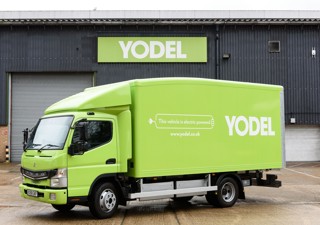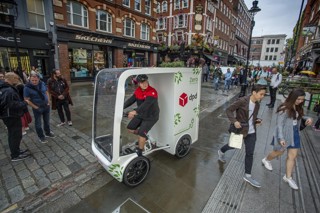UK delivery companies have been flexing their fleets to take on an influx of drivers and vehicles for what they expect to be a record peak season in 2019.
The peak period between Black Friday at the end of November through to the New Year sees many online-only businesses, as well as high street companies, relying more heavily on delivery fleets to process orders.
Last year’s sales event saw around 30 million orders placed on Black Friday – 21 million of which were delivered to customers’ homes.
This works out at around five times the normal daily volume, equating to an extra 210,000 van trips.
While research from IMRG, the UK’s industry association for online retail, predicts that online Black Friday deliveries will only see growth of 2-3% this year, or may even be flat, fleets have still been scaling up.
Hermes has taken on an additional 1,000 trailers, 3,200 scanning devices, 560 drivers, 7,000 couriers and 32 peak managers to join existing teams to provide seasonal support.
Martin Colloff, Hermes head of client and network distribution, estimates the peak period deliveries will be up 14% year-on-year.
CitySprint, the UK same-day distribution company, recruited 500 additional couriers ahead of Christmas.
CitySprint’s additional drivers will be primarily focused on van couriers and they have been added to its 5,000-strong fleet to support the seasonal demand.
The recruitment for drivers at CitySprint has been concentrated on major cities and towns, including central London, Manchester, Bristol, Birmingham, Nottingham, Leeds, Telford, Letchworth, Cambridge and Reading.
Paul Gisbourne, CitySprint chief operating officer, said: “We know the Christmas season brings increased pressure, demand and competition for our customers.
“Bolstering fleet numbers will allow us to continue to deliver a first-class service and ensures we stay ahead of our competitors.”
Yodel brought in an additional 300 vans to help manage additional volume over the peak period, with a mix of short-term rental and permanent additions to the fleet. This was in addition to 70 tractor units and 300 trailers. Yodel recruited 1,000 roles for peak 2019 through a combination of agency, self-employed and full-time drivers.
Carl Moore, chief operating officer at Yodel, said: “This time of year is a unique period for us and other parcel carriers as consumers buy more goods at a faster rate than the rest of the year.
“We take a strategic approach to upscaling our fleet and workforce to ensure we manage the additional volume that Black Friday, Cyber Monday and Christmas bring.”
While DPD wouldn’t reveal how many additional drivers or vehicles it had to add to its fleet this year, it said its preparations start in the preceding January and it is expecting record delivery volumes for peak 2019.
Royal Mail declined to comment on its peak 2019 plans, but it did say its own research shows that online festive shopping has increased by 11% year-on-year.
Colloff said planning for peak starts as soon as the previous peak delivery period finishes enabling 12 months of preparation.
He said: “We use data from years of operation along with estimations of parcel volume. Using this, we can accurately predict what our busiest day and week will be the following year.
“This ensures we have the required additional capacity and vehicles needed to deliver increased parcel volumes.”
Hermes implemented a £16 million project at its parcel distribution hub in Rugby to support its peak plans.
The investment saw an additional third tier hub being built, resulting in an additional capacity of 40%.
It has meant Hermes has increased capacity across its network to handle 2.5 million parcels each day.
Colloff said: “To be prepared for all eventualities, we have a team dedicated to keeping the operation running smoothly.
“During bad weather this includes monitoring road surface temperatures and forecasts, with grit and snow ploughs strategically placed across the network.”
Hermes has also launched a number of new initiatives this year to help address the potential UK driver shortage.
Its Road to Logistics scheme has been developed to enable people who may not have any driving experience to gain skills and the possibility of full-time employment in the logistics sector.
Colloff said the scheme has been designed to ensure Hermes has its own ‘talent pipeline’ and is prepared for any future legislation and possible Brexit impact.
Kieran Smith, chief executive at Driver Require, the driver recruitment specialist, estimates that the UK is suffering from a shortage of 50,000 to 60,000 drivers and more than 10% of the workforce are from the EU.
Smith said the problem can be solved with approximately 42,000 newly qualified drivers entering the market compared with 10,000 leaving annually. But the next six to 12 months are critical.
The Freight Transport Association (FTA) estimates that 59,000 HGV drivers will be needed over the next 12 months to avoid significant issues for peak 2020.
The FTA wants the Government to amend its post-Brexit immigration policy to retain existing EU workers and welcome new ones after the UK leaves the EU.
Sally Gilson, FTA head of skills campaigns, said: “With UK Christmas present spending now topping £19 billion a year, and 42% of that spent online, the pressure on logistics businesses to deliver a flawless Christmas for consumers and businesses alike is increasing every year.
“At the same time, the availability of HGV drivers to deliver these gifts and other vital commodities has declined by 16,000 year-on-year despite soaring demand for their services.”
Gilson said EU workers currently make up 13% of the logistics sector’s entire workforce.
The number of EU nationals moving to the UK for work is now more than 50% lower than its peak period between June 2015-June 2016.
Gilson said: “The Government’s proposed post-Brexit immigration policy fails to take into account what these employees bring to industry and, instead, is based around arbitrary academic levels and minimum salary requirements, not what the UK economy needs to remain functional.
“FTA is urging the Government to amend its future immigration policy to allow these workers continued access post-Brexit; the Government must prioritise the recruitment and retention of HGV drivers alongside other logistics staff, to future-proof Christmas for years to come.”























David Dunn - 18/12/2019 11:37
This lack of drivers was always going to be an issue after the driving licence eligibility was changed back in 1997. How many unemployed or low income workers can afford the £3k+ to be trained as a hgv driver. Would it not be better to lobby government to help the industry recruit and train new drivers. Yes it will cost the industry in the short term but how much more will it cost if they cannot keep up with the demand. A shortage of 60k drivers before any exodus of migrant workers must surely be taken as a red flag that something needs to be done now.